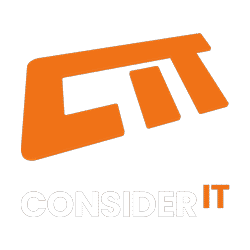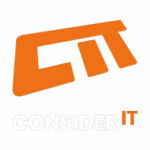As cyber threats continue to evolve, businesses must prioritise cybersecurity to safeguard their data and operations. Cyber Essentials, a vital cybersecurity certification scheme developed by the UK government, offers a solid foundation for organisations seeking to strengthen their cyber resilience. In this article, we will explore the five main technical controls involved in Cyber Essentials and examine relevant statistics from the UK government’s Cyber Security Breaches Survey 2023. Additionally, we’ll highlight the importance of engaging with reputable cybersecurity experts, such as Consider IT, to navigate the certification process effectively.
Secure Configuration
Secure configuration serves as a crucial defence against cyberattacks. Ensuring that systems, devices, and software are configured securely helps prevent vulnerabilities. To ensure secure configurations organisations should adopt a comprehensive approach. Firstly, conducting regular security audits and vulnerability assessments is crucial to identify weaknesses and address them promptly. Enforcing strong password policies and using multi-factor authentication adds an extra layer of protection, as passwords form the first line of defence against unauthorised access to systems and sensitive information. According to the Cyber Security Breaches Survey 2023, in 2021, 79 percent of surveyed organisations reported implementing password policies. However, this figure experienced a concerning decline to 70 percent in 2023. This trend underlines the need for organisations to reinforce their password policies, and assess their cyber security strategies to safeguard against potential breaches.
Boundary Firewalls and Internet Gateways
Network firewalls act as essential gatekeepers, preventing unauthorised access to private networks and reducing the risk of cyber intrusions. In 2021, 78 percent of surveyed organisations had implemented network firewalls, but this figure declined to 66 percent in 2023. This downward trend highlights the urgency for businesses to prioritise network security, fortifying their defences against cyber threats seeking to exploit network weaknesses.
Access Control
Access control involves managing user accounts and permissions to ensure that only authorised individuals have access to systems, data, and services. It includes measures such as using strong passwords, implementing multi-factor authentication, and regularly reviewing and revoking access rights. In 2021, 75 percent of organisations acknowledged restricting admin rights effectively, but this number dropped to 67 percent in 2023. Many businesses who do not implement proper access control cite issues such as resource constraints, organisational culture, the assumption of safety or convenience for employees to make updates to their own machine. Don’t fall victim to cyber attacks for the sake of convenience or assumed safety – bad actors count on that!
Malware Protection
Protecting systems against malware is critical to prevent malicious software from infiltrating and disrupting operations. Malware can find its way onto your systems in a number of ways. Your employees might unknowingly download malicious attachments from emails, fall victim to deceptive links leading to infected websites, or download software from unreliable sources that contains hidden malware. Visiting compromised websites or clicking on malicious ads can also trigger drive-by downloads. Social engineering tactics can be employed to deceive you into downloading and running malware. Even seemingly harmless USB devices can spread infections. Additionally, outdated software with known vulnerabilities can be exploited by cybercriminals. To safeguard your system, make sure your staff receive regular security training, use reputable antivirus software, stay updated with the latest patches, exercise caution with email and downloads, and avoid untrusted sources. Regular data backups are also crucial for added protection.
The government cyber breaches survey highlighted a decline in organisations using malware protection, with only 71 percent deploying this control in 2023, compared to 78 percent in 2021. Make sure your business doesn’t become a casualty.
Patch Management
Applying software security updates promptly is crucial in addressing known vulnerabilities and protecting systems from cyber threats. Alarming statistics from the Cyber Security Breaches Survey 2023 indicate that only 31 percent of organisations managed to apply software security updates within 14 days in 2023, as compared to 43 percent in 2021. The decline in timely updates exposes businesses to potential exploits that cybercriminals frequently target.
Why do you need Cyber Essentials?
In a rapidly evolving digital landscape where cyber threats loom large, safeguarding your organisation’s data and systems is of utmost importance. Cyber Essentials provides a foundational cybersecurity framework that can bolster your cyber health significantly. With recent statistics from the UK government’s Cyber Security Breaches Survey 2023 indicating a decline in the adoption of essential technical controls, now is the time for companies to take proactive steps to protect their assets.
To ensure your organisation’s compliance and certification in Cyber Essentials, consider partnering with Consider IT – a trusted and experienced cybersecurity services provider. Consider IT is committed to empowering businesses with robust cybersecurity measures, and we specialise in helping companies achieve Cyber Essentials certification efficiently. As one of the only Scottish Managed Service Providers (MSPs) that are IASME certified, Consider IT brings a wealth of knowledge and expertise to the table, providing comprehensive solutions tailored to your unique business needs.
Get in touch today.




